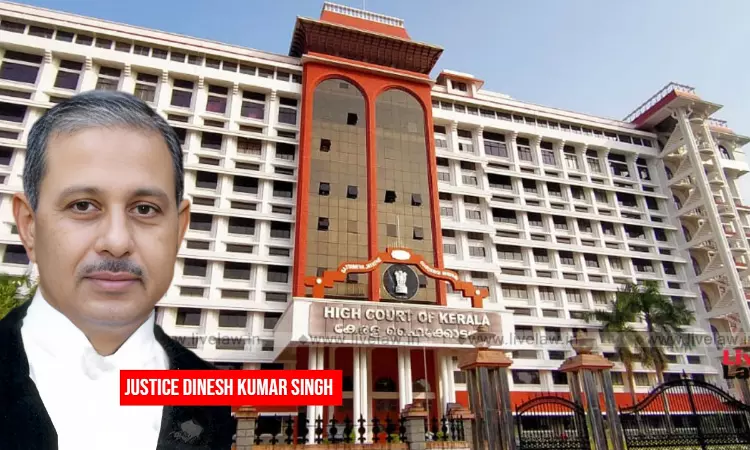- Home
- /
- High Courts
- /
- Kerala High Court
- /
- Kerala High Court Upholds Right To...
Kerala High Court Upholds Right To Change Religion & Name In Educational Records Upon Conversion
Rizmi Lia
4 Jun 2025 12:43 PM IST
The Kerala High Court has recently upheld an individual's right to change their religion under Article 25 of the Constitution of India and to have such changes reflected in educational records.The order was delivered by Justice D. K. Singh.BackgroundThe writ petition arose when the petitioner, Sudhin Krishna C.S., originally recorded as Mohammed Riyazudeen C.S. by his father in his...
The Kerala High Court has recently upheld an individual's right to change their religion under Article 25 of the Constitution of India and to have such changes reflected in educational records.
The order was delivered by Justice D. K. Singh.
Background
The writ petition arose when the petitioner, Sudhin Krishna C.S., originally recorded as Mohammed Riyazudeen C.S. by his father in his educational records, sought to change his name and religion in his SSLC book. The petitioner's mother followed the Hindu faith, while his father was a Muslim. Raised by his mother in Hindu traditions, the petitioner converted to Hinduism upon attaining majority and obtained a gazette notification to that effect.
Distressed that his official records still reflected his old name and religion, he approached the District Educational Officer (DEO) seeking the necessary changes. However, no action was taken, and the respondents contended that the Kerala Education Rules (KER), 1959, did not contemplate such changes.
The petitioner relied on two earlier judgments Naveed M.C. @ Noufal v. State of Kerala [W.P.(C) No. 3832/2021] and Lohith S. v. State of Kerala [W.P.(C) No. 22847/2024] and argued that under Rule 3(1) of Chapter VI of the KER, changes in name, religion, and date of birth could be effected.
Court's Ruling
Justice Singh interpreted Rule 3(1) of Chapter VI of the KER and held that the heading of the Rule “Alteration of Date of Birth etc.” clearly allows for changes not only in date of birth but also in other particulars such as religion and caste. The Court observed that multiple authorities could be notified for effecting such changes and that the Commissioner of Examinations, already notified to change the date of birth, would also be competent to make changes in religion and caste.
Rejecting the respondents' submission, the Court held that the Commissioner of Examinations is the competent authority to effect changes in the petitioner's name and religion in the SSLC book.
The Court emphasized that Article 25 of the Constitution guarantees the freedom of conscience and the right to freely profess, practice, and propagate religion, subject to public order, morality, and health.
The court observed:
“If a person has changed his religion without any coercion, fraud, undue influence etc, such an act would be protected under the Constitution of India under the preamble as well as Article 25. He has the fundamental right to practice religion and faith as of his choice.”
In arriving at its decision, the Court relied upon several key judgments, including Smt. Sarla Mudgal, President, Kalyani and others v. Union of India [(1995) 3 SCC 635], Lily Thomas v. Union of India and others [(2000) 6 SCC 224], Indian Young Lawyers Association v. State of Kerala (Sabarimala Temple case) [(2019) 11 SCC 1], and Dr. M. Ismail Faruqui and others v. Union of India and others [(1994) 6 SCC 360], all of which collectively reinforce the principle that every individual has the fundamental right to freely choose, practice, and propagate their religion, provided it does not infringe upon the rights and freedoms of others.
The Court directed the respondents to effect the changes sought by the petitioner in his SSLC book and clarified that Rule 3(1) of Chapter VI of the KER, 1959, provides for changes in religion and caste in addition to date of birth.
This landmark ruling reinforces an individual's right to practice and profess a religion of their choice and ensures that official records reflect one's chosen identity, thereby upholding essential constitutional principles of self-expression, autonomy, and religious freedom.
Counsel for the Petitioner: Advocates Santheep Ankarath, P. Anirudhan
Counsel for the Respondents: Adv. Paravathy Kottol (GP)
Case No: WP(C) 41609 of 2024
Case Title: Sudhin Krishna C. S. v State of Kerala and Others
Citation: 2025 LiveLaw (Ker) 311
Click Here To Read/ Download Order



